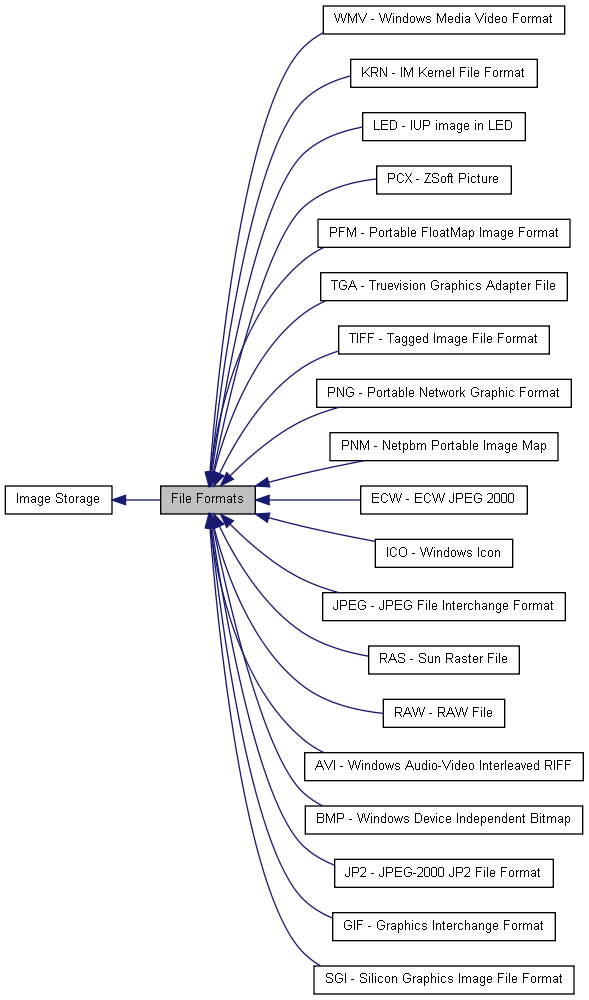
|
Detailed Description
- See im.h
Internal Predefined File Formats:
- "BMP" - Windows Device Independent Bitmap
- "GIF" - Graphics Interchange Format
- "ICO" - Windows Icon
- "JPEG" - JPEG File Interchange Format
- "LED" - IUP image in LED
- "PCX" - ZSoft Picture
- "PFM" - Portable FloatMap Image Format
- "PNG" - Portable Network Graphic Format
- "PNM" - Netpbm Portable Image Map
- "RAS" - Sun Raster File
- "RAW" - RAW File
- "SGI" - Silicon Graphics Image File Format
- "TGA" - Truevision Targa
- "TIFF" - Tagged Image File Format
Other Supported File Formats:
- "JP2" - JPEG-2000 JP2 File Format
- "AVI" - Windows Audio-Video Interleaved RIFF
- "WMV" - Windows Media Video Format
Some Known Compressions:
- "NONE" - No Compression.
- "RLE" - Run Lenght Encoding.
- "LZW" - Lempel, Ziff and Welsh.
- "JPEG" - Join Photographics Experts Group.
- "DEFLATE" - LZ77 variation (ZIP)
Function Documentation
| void imFormatRegisterInternal | ( | void | ) |
Registers all the internal formats.
It is automatically called internally when a format is accessed, but can be called to force the internal formats to be registered before other formats. Notice that additional formats when registered will be registered before the internal formats if imFormatRegisterInternal is not called yet.
To control the register order is useful when two format drivers handle the same format. The first registered format will always be used first.
| void imFormatRemoveAll | ( | void | ) |
Remove all registered formats. Call this if you are checking memory leaks.
| void imFormatList | ( | char ** | format_list, | |
| int * | format_count | |||
| ) |
Returns a list of the registered formats.
format_list is an array of format identifiers. Each format identifier is 10 chars max, maximum of 50 formats. You can use "char* format_list[50]".
im.FormatList() -> format_list: table of strings [in Lua 5]
| int imFormatInfo | ( | const char * | format, | |
| char * | desc, | |||
| char * | ext, | |||
| int * | can_sequence | |||
| ) |
Returns the format description.
Format description is 50 chars max.
Extensions are separated like "*.tif;*.tiff;", 50 chars max.
Returns an error code. The parameters can be NULL, except format. See also File Formats.
im.FormatInfo(format: string) -> error: number, desc: string, ext: string, can_sequence: boolean [in Lua 5]
| int imFormatInfoExtra | ( | const char * | format, | |
| char * | extra | |||
| ) |
Returns the format information of the third party library used to support the format.
Format extra is 50 chars max.
Returns an error code. See also File Formats.
im.FormatInfoExtra(format: string) -> error: number, extra: string [in Lua 5]
| int imFormatCompressions | ( | const char * | format, | |
| char ** | comp, | |||
| int * | comp_count, | |||
| int | color_mode, | |||
| int | data_type | |||
| ) |
Returns the format compressions.
Compressions are 20 chars max each, maximum of 50 compressions. You can use "char* comp[50]".
color_mode and data_type are optional, use -1 to ignore them.
If you use them they will select only the allowed compressions checked like in imFormatCanWriteImage.
Returns an error code. See also File Formats, imErrorCodes, imDataType, imColorSpace and imColorModeConfig.
im.FormatCompressions(format: string, [color_mode: number], [data_type: number]) -> error: number, comp: table of strings [in Lua 5]
| int imFormatCanWriteImage | ( | const char * | format, | |
| const char * | compression, | |||
| int | color_mode, | |||
| int | data_type | |||
| ) |
Checks if the format support the given image class at the given compression.
Returns an error code. See also File Formats, imErrorCodes, imDataType, imColorSpace and imColorModeConfig.
im.FormatCanWriteImage(format: string, compression: string, color_mode: number, data_type: number) -> can_write: boolean [in Lua 5]
 1.7.1
1.7.1